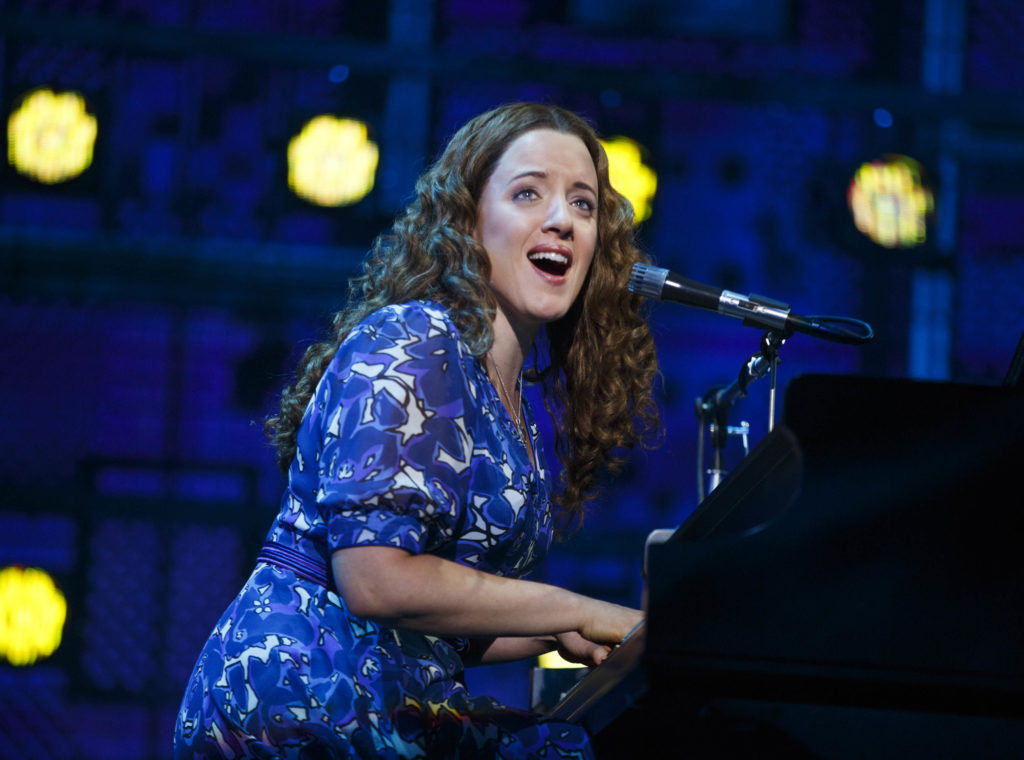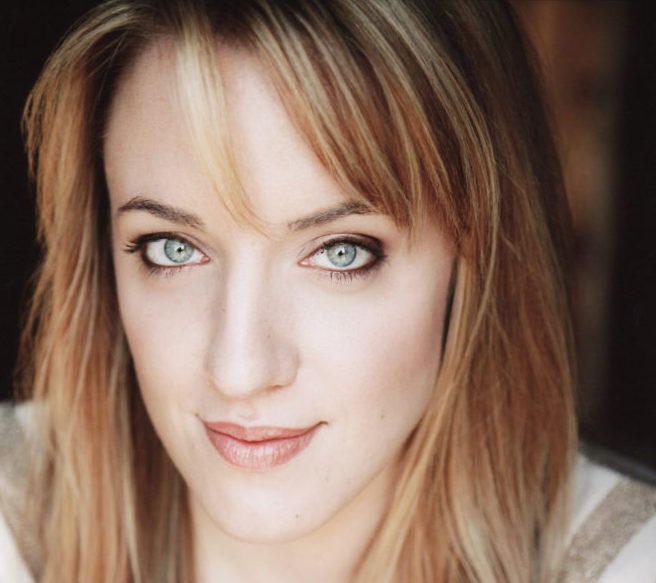Abby Mueller is currently inhabiting the world of Carole King in the Broadway musical “Beautiful: The Carole King Musical.” The role is clearly a familiar one to the actress, who was the first to play it on the national tour, and subsequently took it on for Broadway last year. She recently returned to Broadway to play King, succeeding Melissa Benoist from “Supergirl.” Mueller’s sister, Jessie Mueller, won a Tony for originating the role on Broadway.
Prior to the “Beautiful” tour, Mueller appeared in “Kinky Boots,” “A Minister’s Wife,” and the Off-Broadway workshop of “School of Rock.” Her regional credits include “1776,” “Les Misérables,” “Miss Saigon,” “Candide” and “Pippin.”
We recently chatted with Mueller about coming back to “Beautiful,” how she channels the spirit of Carole King day after day, and why she thinks the show is striking a chord with multiple generations.
“Beautiful: The Carole King Musical” is currently playing at the Stephen Sondheim Theatre. Mueller will lead the show until the end of 2018.
W&H: What’s it like playing music legend Carole King night after night? How do you manage to channel her entire history and spirit into the course of a few hours?
AM: A huge part of that is getting to sing Carole King’s music. I also owe a lot to the book writer [Douglas McGrath] because he created a wonderful template in the way that the songs unfold and progress in the story. It’s organic in a lot of instances. For example, at the moment where she collects the music that Gerry [Goffin, King’s first husband and collaborator] has been working on all night as she’s been sleeping on the couch, she plays the first few notes of “Will You Still Love Me Tomorrow?” She discovers her ability to make music along with the audience, and that’s one example of me as the actor working on this discovery every night.
But you also look at the music and lyrics of this song — how can you not feel something from that music? I know I certainly do, and hundreds of audience members do as well. Her music is so visceral, so honest, so relatable. I think that’s why people have a powerful response to it, and as long as I focus on that, I’m able to let the power of her music and joy surrounding the song [come through]. The source material is just so rich, so I just sink in there and let it bubble up through me. I feel such a strong sense of responsibility and honor to be playing such a living legend, and I just hope that the story is channeled through me.
W&H: What did you know about Carole King before you took on this role?
AM: Before I saw the musical, I actually didn’t know a lot about her. I knew “Tapestry” [King’s iconic 1971 album] of course, as everyone seems to. But I didn’t know a lot about her personal life, let alone the fact that she wrote so many other huge hits before it, which is a response I get a lot at the stage door from audience members. It’s really fun to go on that journey every night with the audience because that’s how I felt when I first saw the show.
W&H: You’re a different generation, of course. What did you know about Carole King before you got the role, and why do you think her story is striking such a chord across generations on Broadway?
AM: I knew her music, the way she wrote from personal experience, and obviously, the way the music fits into her personal story as most people’s art does. Combining that story of love and loss and heartbreak and picking yourself up and trying again are universal storylines that everyone can relate to, combined with the power of this soundtrack — it packs a punch.
It’s an emotional night in the theater that a lot of people aren’t expecting. They go in expecting to love the music but they have a fuller experience than they expected.
W&H: You’ve been very involved with the show, both on Broadway and with the national tour. What has the road been like to get here in terms of the creative process?
AM: I was cast in the national tour back in 2015 and was really fortunate. We had the original set and blocking that was already established, but I really felt that the director Marc Bruni gave all of us a lot of space to create our version. We felt free to create the whole national tour version, and I never felt I was being fit into a previous template which was really lovely and is not always the case. Being able to transition into the Broadway company was thrilling.
I first joined the cast last year for six months, and I was fortunate to have some really collaborative scene partners. I did my best to try to fit into their version, so there was that adjustment, but it was really seamless. I felt really fortunate that people have really given me the opportunity to bring myself to the character.
Now it’s version 3.0 on Broadway. I didn’t expect it, and I’m enjoying every minute.
W&H: How collaborative has Carole King been with you on this character, if at all?
AM: I first got to meet her when we just started rehearsals in 2015. The team had organized a press event on “Today” in 2015. They wanted Chilina Kennedy, who was playing Carole on Broadway at the time, and myself to sing with her on the show — no pressure. That was the first time I met her.
We rehearsed in a side room at the Sondheim Theatre. I remember showing up and she walked through the door, and my head exploded. But she has been so lovely and warm to me, just like you think she would be from her music. She’s very down to earth and is so inclusive.
At one point, when we were backstage at “Today” she said, “Do you want to take a video of me playing the piano so you can watch my hands?” So I said, “Absolutely, I do!” and I took that video and still have it to watch her body language.
She also came to visit the tour when we were in Boston and gave us her thumbs up. I’ll never forget when she told me, “Enjoy being me. Enjoy the music.” You can’t get better advice than that, so I certainly have been [doing so]. It’s a unique challenge and an opportunity to do a role like this, where you get to make such an arc, both time-wise and emotionally. It’s not every day that these roles come along.
W&H: “Beautiful” offers a great message of female empowerment and independence. Talk about how it feels to be in a show like this in the dawn of #MeToo.
AM: In the play, we are watching a young woman come of age in the 1950s, 1960s, and 1970s. So much was happening then as a woman in a man’s profession. [Carole King] really was breaking down a lot of stereotypes and was outside the box in terms of typical gender roles.
I think what’s so tangible to the current moment is that she was a woman discovering herself. She was dealing with a lot of things women still deal with as far as challenges in the workplace, choosing to be a wife and mother, then being a working wife and mother, and how you navigate that. These are old concepts, but women still feel this way in 2018.
One of the things I admire about Carole’s story is that she didn’t like touring that much. Even when “Tapestry” was a big hit, she would only tour so much so she could go home and be with her kids. She wasn’t just a rock star — she was a rock star on her own terms. I really admire that. She was true to her own voice. She wanted to make music she wanted to make. She made a huge jump by going from writing songs for others to singing her own songs, which obviously paid off because people relate to her voice and honesty. That is such a wonderful and powerful take-home message about staying true to yourself and valuing your voice.
Not to generalize, but that’s what is happening today and seems to keep happening for women. We need to be reminded that it’s okay to use our voice for good and to express ourselves. When people are speaking their truth in a compassionate way, it’s key. It allows others to speak up.
W&H: Your sister, Jessie Mueller, won a Tony for originating the title role. What is your relationship like and how did it feel to step into her shoes?
AM: It’s been so lovely. I was really reticent to even audition, which I’ve spoken about before because I associated it as hers and I didn’t want to step on any toes. But she’s been nothing but supportive about it.
My dad and my agent encouraged me to do it, and I’m so grateful they believed in me and that the team gave me a shot. It’s really been valuable and enriched my own life to get to do this show at different increments of my life.
W&H: What’s next? I know you’ve done a bit of film — more to come?
AM: I’m really interested in doing TV and film. It’s pretty tricky when you’re on a Broadway schedule because of shooting restrictions, and you’re not always available when you’re playing a lead. I hope to get the chance to do that when the opportunity comes. Right now my priority is doing the show.








